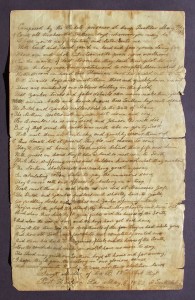 It was indeed an interesting challenge to set poetry by a Confederate soldier to music. The main challenge was to enter into the mindset of the author, Sergeant Charles Miller, a man who believed in a cause I personally would not support. A man, moreover, who insulted my ancestry (Dutch-American) and was full of insults for the North in general. I don’t generally take to this kind of person.
It was indeed an interesting challenge to set poetry by a Confederate soldier to music. The main challenge was to enter into the mindset of the author, Sergeant Charles Miller, a man who believed in a cause I personally would not support. A man, moreover, who insulted my ancestry (Dutch-American) and was full of insults for the North in general. I don’t generally take to this kind of person.
Yet the emotions of the poetry, both the first poem (nine stanzas, of which I used the first three and the last three) and the second poem, entitled “The absent Soldier” (of which I used the second half) spoke to me in spite of the rhetoric. The first poem is full of confidence until the very end. At that point, doubt creeps in: “The Lord may guide” not “The Lord will guide” or “May the Lord guide,” and “I hope they’ll gain the victory.” The second poem first has the soldier envisioning marrying his sweetheart, then a vision of roaming about with his fiddle, eating and drinking when he likes (unlike his situation in the war). Suddenly he seems to realize, “But I’m not there, I’m here in this war, far from home!” And the mood changes to despondency.
Given the characters of the two poems, it came to me to insert the second poem between the two halves of the first poem. This structure captures the changing moods of the writer: the confident hope of victory, the longing to be with his beloved, the yearning for the ordinary pleasures of life, the sadness of realizing his situation far from home, the return to confidence, the momentary doubt, and the resolve never to yield.
Given the fact that the South did have to yield, I wondered how one could possibly end this piece. What emerged was a dying away effect. The voices gradually fade out. The “drum” begins to miss some beats. The “fife” falters. Perhaps the soldiers are limping away? Or is it the ghosts of the soldiers we are hearing?
